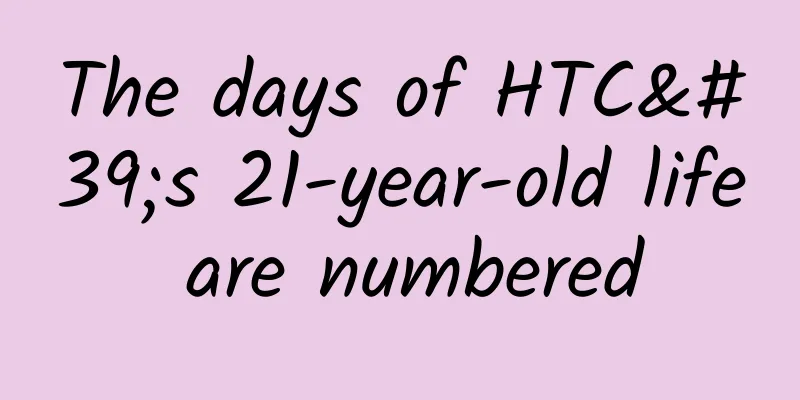The days of HTC's 21-year-old life are numbered

|
"Far and away from faith." Recently, a netizen wrote this sentence in the HTC forum and posted a photo of his newly bought Samsung S8, saying goodbye to HTC in this way. In fact, this is not an isolated case. HTC, which is 21 years old this year, can be said to be at the critical moment of life and death. Due to the sluggish smartphone business and ten consecutive quarters of losses, HTC has been involved in rumors of seeking a new owner several times. It also coincides with the first decline in smartphone shipments in a decade. Under this market, if HTC still fails to make changes in 2018, I am afraid that the words of its fans will come true: "HTC's days are numbered." The root of arrogance As we all know, HTC was once the king of the mobile phone industry, and even took up the banner of the Android camp to compete with Apple. This is still talked about by many fans. "It's a good thing that fans have faith, but the scary thing is that after the smartphone industry has changed hands, HTC has been unwilling to lower its noble head to the world." An industry insider made such an evaluation of HTC. Why is HTC arrogant? We can get a glimpse of this from a new phone it recently launched. On January 15, HTC held a press conference in Beijing and officially released its new U series phone, HTC U11 EYEs. Judging from the name and positioning, the industry calls this phone the youth version of HTC U11. Then there were comments that HTC launched this mid-range model in order to strike while the iron is hot and take advantage of the popularity of the U series to regain the lost ground in the mid-range market. So will the reality really be as it wishes? First of all, judging from HTC's sincerity in the market, the appearance of the new HTC U11 EYEs may arouse fans' desire to recharge. The unique 3D water-ripple glass body and 18:9 full-screen design "shine a touch of aristocratic temperament from the last era in the current sea of mobile phones", and some fans are full of praise for HTC's workmanship and appearance. But after impressing people at first sight, the hardware performance woke up many consumers, because the phone is equipped with a Snapdragon 652 processor, which means that this phone can only "look good". So much so that a review agency later said: "At the beginning of 2018, it was still able to stubbornly come up with the Snapdragon 652 chip and sell it for 3,000 yuan. This is probably something that only HTC can do." After all, mobile phones from brands such as Samsung and vivo, which are also equipped with Snapdragon 652 processors, are priced at less than 3,000 yuan. There is no harm without comparison. Through the comparison of parameters of several mobile phones on the Zhongguancun Online website, HTC's "arrogance" is fully revealed. If consumers expect a price of 3,000 yuan, domestic brands have more cost-effective products such as Xiaomi 6 and vivo X20 to choose from, and international brands also have Samsung's next-generation flagship Samsung S7 Edge as an alternative at this price. So what exactly should HTC rely on to impress consumers? Perhaps HTC itself has not found the answer. If you don't show your sincerity, the fans' faith will eventually be exhausted. According to public data from JD.com, a third-party sales platform, HTC U11 EYEs has only received more than 100 reviews since its launch. How can it regain its lost ground in the mid-range market with such market response? But then again, the dismal sales volume may not be surprising to HTC itself. Also on JD.com, HTC's flagship U11 has only 6,800+ reviews so far, while its competitor Samsung S8 has 50,000+ reviews, and Huawei Mate10 has reached 180,000+ reviews. These are the most direct manifestations of HTC's decline, but as mentioned above, HTC has not compromised with the market and continues to do its own thing. Although it has long since retired from its high position and is gradually declining, its "arrogance" when it was at the top has continued to this day. Industry insiders analyzed HTC's decline: "In the tide of the times, HTC's limelight has long been taken away by up-and-coming companies. Although insufficient marketing capabilities are one of the recognized reasons for its failure, looking at the entire history of HTC's decline, its own anesthesia and stubbornness may be the root cause." Focusing on VR and ignoring the mobile phone business? After the smartphone business was in decline, HTC has set its sights on the VR market in recent years. In the eyes of many analysts, this is actually a desperate move by HTC to survive. At the same time, it is foreseeable that it will be even more difficult for HTC's smartphone business to rise after its U-turn. This is not without evidence, because since HTC bet on VR, there have been constant reports of cutting off its mobile phone business and selling it off as a whole. During this period, HTC has also made many seemingly reasonable moves, but each move really hit the heart of "rice noodle rolls". Recently, according to Digital Trends, the head of HTC North America confirmed the news of layoffs in the local smartphone department. But at the same time, the head said that it is normal to lay off some employees during the integration of the smartphone business and the VR business. As soon as this news came out, rumors that "HTC is about to withdraw from the smartphone market" began to spread again. This is enough to show that HTC's smartphone business, with an uncertain future, is already in jeopardy in the eyes of the outside world. Before the layoffs, HTC had already strategically abandoned its smartphone business. The most typical example was in March 2017, when HTC sold its Shanghai Hongda Electronics mobile phone factory, which was built in 2009, due to poor management. In addition to using the funds raised from the transaction for company operations, some analysts said that most of the funds were used to expand the VR business, which shows how much the declining smartphone aristocrat HTC attaches importance to VR as a lifeline. Although HTC has never directly stated that VR takes precedence over the smartphone business at the strategic level, the outside world has long been tacitly aware of this. From a business perspective, there is nothing wrong with HTC doing this, because if it wants to continue to survive, it has little hope of relying on the smartphone business, but VR can at least give it a try. In fact, HTC has gradually established its position in the VR field in the past two years. With its VIVE, which has good reputation and market performance, it is now able to compete with giants in the international market, and seems to have regained its confidence in the smartphone field. According to data from market research firm TrendForce, global VR device shipments reached 3.7 million units in 2017, of which HTC VIVE shipments reached 500,000 units, ranking third after Sony PS VR and Oculus Rift. However, the marginalization of HTC's smartphone business is in sharp contrast to the achievements of its VR business. Under the guidance of the idea of "it is better to be the head of a chicken than the tail of a phoenix", perhaps one day the prediction that HTC will completely withdraw from the smartphone market will come true. By then, the fans must be feeling very complicated. HTC has survived, but it is no longer the same HTC. 2018 is a life-or-death year Speaking of 2018, it should be a special year for HTC and other mobile phone manufacturers. Because in the past year, my country's smartphone shipments fell for the first time in ten years, which has thrown a difficult problem for all mobile phone manufacturers, some of which are how to achieve growth, and some of which are how to survive. HTC belongs to the latter. Recently, according to a report on the website of the Nikkei Shimbun, the latest data from market research firm IDC showed that global smartphone shipments in 2017 were 1.4724 billion units, a year-on-year decrease of 0.1%. The same is true in China, one of the world's largest markets, which has been in rapid development. Another agency, Canalys, pointed out that in 2017, my country's smartphone market experienced its first negative growth in nearly a decade, with shipments of only 459 million units, down 4% from 2016. And some analysts said that the decline of China's mobile phone market was faster than expected. Because after the development in recent years, consumers have basically completed the upgrade from feature phones to smartphones, and the usage cycle of mobile phones is also extending, so this situation is inevitable. The slowdown in growth has become an established fact, and the space for survival has further shrunk. However, as the protagonists of the battle, the number of mobile phone manufacturers has increased, and the competition will undoubtedly be more intense. Each company will try its best to grab more living space. Whether HTC, which is already struggling in the cracks, can continue to survive with a proud attitude remains to be tested by the market. But looking at the development history of HTC's smartphone business, perhaps it would rather die standing than live on its knees. Baidu Index clearly shows this point. HTC's search index in recent years is basically consistent with its actual market history. In 2011, HTC occupied 15% of the global mobile phone market, and was the real Android big brother. Its market influence reached its peak at that time. However, since then, the downward trend has explained everything. Its market influence has become smaller and smaller, and its market share has fallen again and again. The beautiful turnaround that everyone expected has not yet been launched. Seeing this tragic situation, many people in the industry began to compare HTC to another Nokia. Both were once the dominant players in the mobile phone industry, and both have fallen from the altar. But in fact, this statement is not accurate. After Nokia adjusted its strategy and returned to the Chinese market in 2016, a series of market data showed that it has gradually developed in a positive direction. Although it is still difficult to achieve a "return of the king", at least its efforts to return to the right path have begun to show results. Counterpoint analyst Neil Shah revealed that Nokia's mobile phone sales surpassed HTC in the fourth quarter of 2017. But looking back at HTC, even at a time when Baidu search suggestions give out "Why no one buys HTC phones" and "Why HTC phones are not popular anymore", HTC's official website still has the slogan "Leader in smart phones". In view of this, no one can give a definite conclusion except HTC itself as to whether HTC’s smartphone business will be completely cut off in 2018. But one thing that is clear to everyone is that HTC’s days are numbered. |
<<: What is the role of artificial intelligence in mobile app development and business?
Recommend
GET! Ancient genes from 6,000 years ago! DNA technology makes ancient people "untraceable"
On September 17, the Wuxi Institute of Cultural R...
A brief introduction to the 400 phone application steps
The scope of use of 400 telephones is constantly ...
China Association of Automobile Manufacturers: Economic Operation of Automobile Industry in January 2022
In January 2022, the overall situation of automob...
Has the pathogenicity of XBB increased? How can ordinary people celebrate the New Year in a healthy way? Here comes the answer →
On the afternoon of January 8, the State Council’...
A good WeChat operation is better than 100 salespeople: In-depth analysis of WeChat operation
Introduction: Every time technology breaks throug...
Exclusive broadcasting has become a shortcut. Can video websites dominate the market by doing so?
January 5 (Reporter Zhang Zhichang) "Exclusi...
What is bidding hosting?
The so-called bidding hosting mainly refers to th...
The most complete salon event planning summary in history!
Introduction: For operations personnel, the work ...
Super luxury cars suddenly impose 10% tax on the rich, Maserati is the most affected
On the evening of November 30, the Ministry of Fi...
This may be the smallest cat in history, living in Anhui | Natural Trumpet
Welcome to the 74th issue of the Nature Trumpet c...
Benxi Mini Program Production Company, how much does it cost to produce a learning mini program?
Mini programs provide convenience for publicity a...
What can Uber learn from Airbnb in international expansion?
As Silicon Valley's hottest startups with a v...
The spring breeze blows, the flowers smile, why is your nose so noisy?
Spring is the most beautiful season of the year, ...
Is it true that Android sub-thread UI operations are not allowed?
Author: Zhang Xichen, vivo Internet Server Team 1...
Don't buy it anymore! The flower you bought may be a national second-level protected plant! Be careful of breaking the law
Expert of this article: Rong Hai, plant science w...









